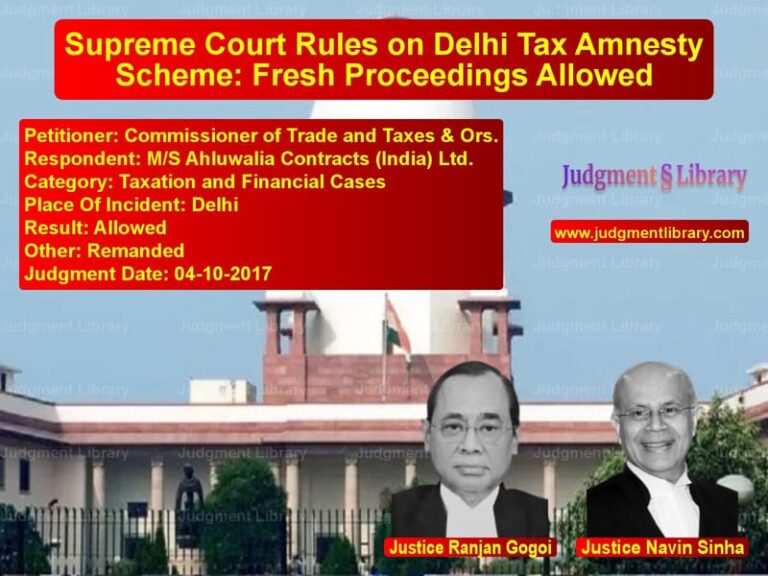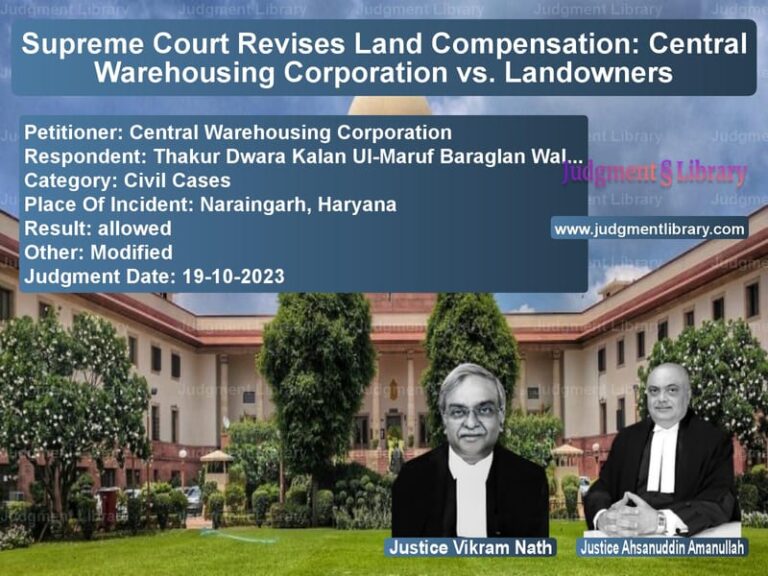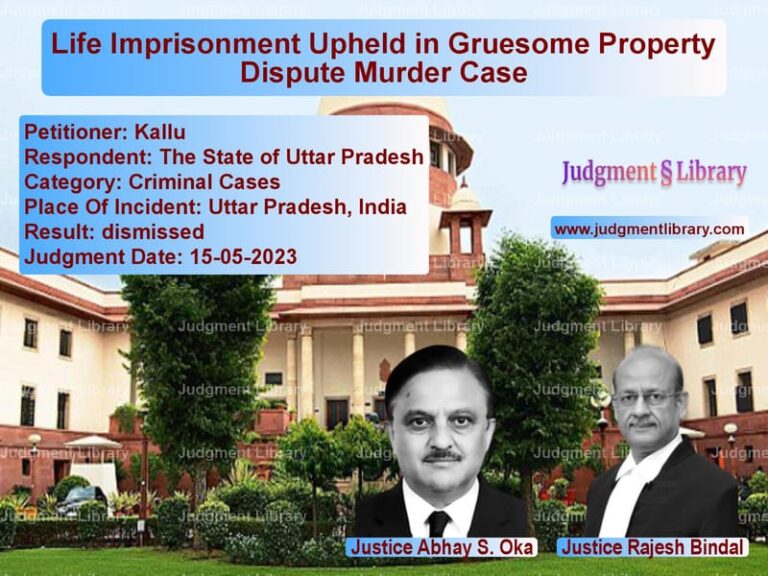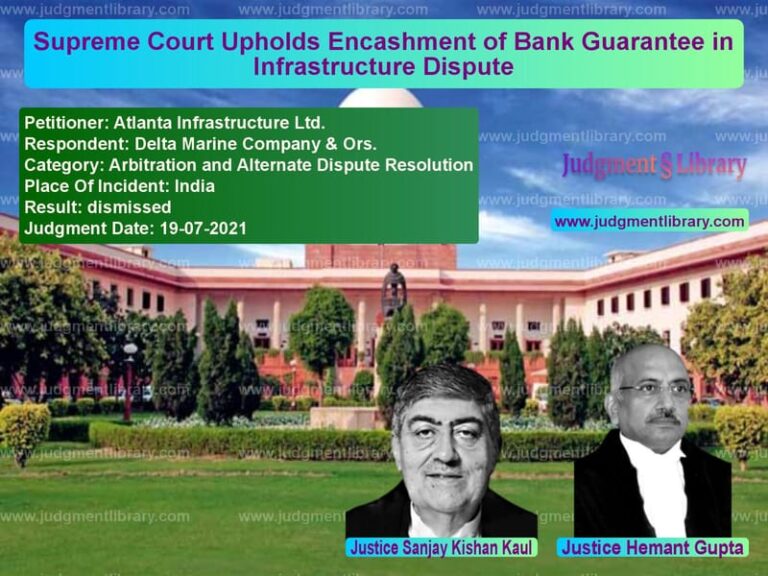Arbitration Seat Jurisdiction: Supreme Court’s Verdict in Contract Dispute
The Supreme Court of India recently delivered a landmark ruling in the case of BBR (India) Private Limited v. S.P. Singla Constructions Private Limited, which dealt with a significant issue concerning arbitration proceedings—whether a change in the venue of arbitration leads to a shift in the jurisdictional seat. This case highlights the importance of understanding arbitration clauses, the legal distinction between the ‘seat’ and ‘venue’ of arbitration, and the jurisdictional authority of courts under the Arbitration and Conciliation Act, 1996.
Background of the Case
The dispute arose from a contract dated 30th June 2011 between the appellant, BBR (India) Private Limited, and the respondent, S.P. Singla Constructions Private Limited. The agreement involved the supply, installation, and stressing of cable strays for a bridge over the river Ravi at Basouli, Jammu and Kashmir.
The contract contained an arbitration clause that stipulated:
“Any dispute arising between the contractor and subcontractor shall be resolved by arbitration of a sole arbitrator appointed by the managing director of S.P. Singla Constructions Pvt. Ltd.”
However, the clause did not explicitly specify the ‘seat’ of arbitration, leading to a legal conflict over jurisdiction.
Proceedings Before the Arbitrator
As disputes arose, arbitration commenced with Justice (Retd.) N.C. Jain as the sole arbitrator. During the initial proceedings:
- On 5th August 2014, the arbitrator designated Panchkula, Haryana, as the place for arbitration.
- Subsequent hearings were held in Chandigarh and Panchkula.
- On 29th May 2015, Justice Jain recused himself from the case.
- A new arbitrator, Justice (Retd.) T.S. Doabia, was appointed, who subsequently shifted the arbitration venue to New Delhi.
Legal Conflict on Jurisdiction
The primary legal issue was whether the shift in the arbitration venue from Panchkula to Delhi effectively changed the ‘seat’ of arbitration, thereby altering the jurisdiction of the courts. The appellant sought to challenge the arbitration award under Section 34 of the Arbitration and Conciliation Act before the Delhi High Court. However, the respondent contended that the courts in Panchkula had jurisdiction.
Read also: https://judgmentlibrary.com/supreme-court-sentences-developer-for-contempt-in-real-estate-dispute/
Arguments Before the Supreme Court
Appellant’s Arguments
- The shift in the venue of arbitration to Delhi indicated an implied change in the jurisdictional seat.
- As per the ruling in Inox Renewables Ltd. v. Jayesh Electricals Ltd., a shift in the venue resulted in a shift in the seat.
- Since the arbitration award was pronounced in Delhi, courts in Delhi had jurisdiction.
Respondent’s Arguments
- The initial arbitrator had already determined Panchkula as the seat of arbitration.
- Under the principles laid down in BGS SGS Soma JV v. NHPC Ltd., a shift in venue does not automatically change the seat.
- The appointment of a new arbitrator does not grant authority to change the agreed-upon seat of arbitration.
Supreme Court’s Ruling
The Supreme Court held that:
- Once the ‘seat’ of arbitration is fixed, subsequent changes in venue do not alter the jurisdictional seat.
- The decision of the first arbitrator fixing Panchkula as the seat remained valid.
- The courts in Panchkula had exclusive jurisdiction to hear any arbitration-related proceedings.
- The appellant’s challenge before the Delhi High Court was not maintainable.
Key Judicial Observations
The Supreme Court made significant observations:
“The seat of arbitration is akin to an exclusive jurisdiction clause. Once the seat is designated, only the courts in that jurisdiction have supervisory control over arbitration proceedings.”
The Court also clarified that an arbitrator does not have unilateral authority to change the jurisdictional seat unless mutually agreed upon by the parties.
Impact of the Judgment
This ruling has significant implications for arbitration in India:
- It reinforces the importance of expressly defining the ‘seat’ in arbitration agreements.
- It establishes that a mere change in venue does not affect jurisdiction.
- It provides clarity on the role of arbitrators in determining and modifying arbitration seats.
The judgment ensures that parties cannot manipulate jurisdiction by shifting venues, thus providing stability and predictability in arbitration proceedings.
Petitioner Name: BBR (India) Private Limited.Respondent Name: S.P. Singla Constructions Private Limited.Judgment By: Justice Sanjiv Khanna.Place Of Incident: Panchkula, Haryana.Judgment Date: 18-05-2022.
Don’t miss out on the full details! Download the complete judgment in PDF format below and gain valuable insights instantly!
Download Judgment: bbr-(india)-private-vs-s.p.-singla-construc-supreme-court-of-india-judgment-dated-18-05-2022.pdf
Directly Download Judgment: Directly download this Judgment
See all petitions in Arbitration Awards
See all petitions in Dispute Resolution Mechanisms
See all petitions in Institutional Arbitration
See all petitions in Arbitration Act
See all petitions in International Arbitration
See all petitions in Judgment by Sanjiv Khanna
See all petitions in dismissed
See all petitions in Quashed
See all petitions in supreme court of India judgments May 2022
See all petitions in 2022 judgments
See all posts in Arbitration and Alternate Dispute Resolution Category
See all allowed petitions in Arbitration and Alternate Dispute Resolution Category
See all Dismissed petitions in Arbitration and Alternate Dispute Resolution Category
See all partially allowed petitions in Arbitration and Alternate Dispute Resolution Category







